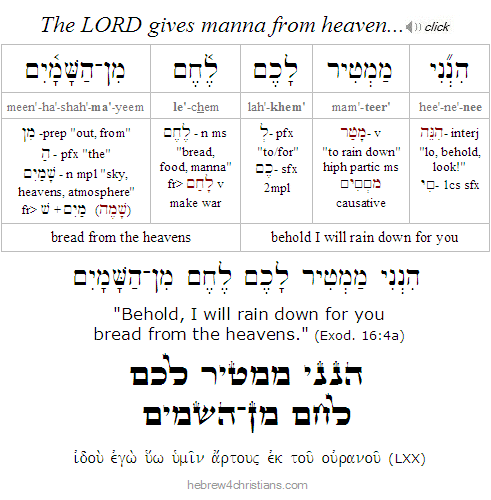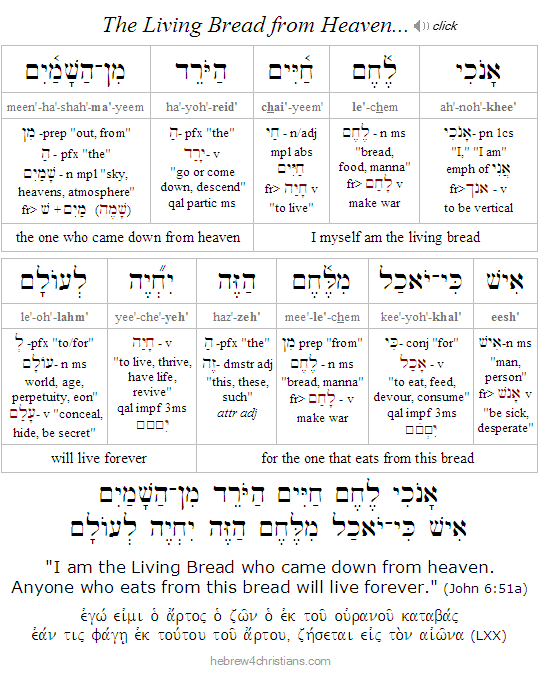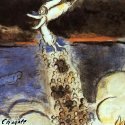|
Exactly one month after the Exodus (i.e., Iyyar 15), the LORD led the Israelites from the oasis and palm trees at Elim (אֵילִם) into the deeper part of the desert, to midbar Sin (מִדְבַּר־סִין), a desolate region that was about midway to Sinai going southeast (Exod. 16:1). About this time, the food provisions the people had brought with them ran out, and the Israelites began grumbling against Moses and Aaron, saying: "If only we had died by the hand of God in the land of Egypt, when we sat by the pots of meat (סִיר הַבָּשָׂר), when we ate bread to our fill, for you have brought us out into this desert to starve to death!" (Exod. 16:3). The LORD then said to Moses, "'Behold, I am going to rain down bread from heaven (לֶחֶם מִן־הַשָּׁמָיִם) for you. The people will go out and gather a portion for that day so that I might test whether they will walk in my Torah (תּוֹרָה) or not" (Exod. 16:4). Each Friday the people received a double portion to last them through Shabbat, and the test (nisayon) centered on whether they would refrain from seeking the bread (i.e., manna: מָן) on God's appointed day of rest. Note the Ten Commandments had not yet been given to Israel at this time, so it is likely that the test of manna was meant to prepare them for the law of the Sabbath that would be given at Sinai the following month (i.e., on Sivan 6, or Shavuot).
Hebrew Lesson
Exodus 16:4a reading (click for audio):
 |
Manna was a symbol of God's provision for His betrothed. Eating the bread given from heaven was therefore communal. God was acting the role of Provider for his beloved, though she would be tested to see if she would set aside special time to share her meal with Him on the Sabbath.
Here are some interesting things regarding the manna:
- It fell at night - unobserved - while the Israelites slept. The manna was said to fall directly in front of the tents of the faithful, but those who grumbled had to go out and search diligently for it. God is not ostentatious in His provision. He gives without His left hand knowing what his right has done (Matt. 5:3)... In the same way Yeshua was born "while Israel slept" but was found by the faithful remnant. He is called "the Bread of Life" (לֶחֶם הַחַיִּים) by those who find sustenance in Him (John 6:35).
- It appeared "in the morning" but would melt away as the day wore on (Exod. 16:21). If you missed the opportunity to collect it, you would suffer hunger... In the same way, we are all given opportunity to "seek the LORD while he may be found; call upon him while he is near," but we can miss His presence if we grow lethargic or indolent. We are called to show up to receive the blessing....
- It was readied for use. The Midrash says that first the morning dew fell, smoothing the ground, then came the food itself, followed by another covering of dew. This explains the tradition of spreading a tablecloth, placing two challah loaves on it, then covering the loaves with a separate cover on our Sabbath tables (the two loaves recall the double portion of manna that fell every Friday in honor of Shabbat).
- It was sufficient. Only enough manna fell to last for one day's need: it was "daily bread" (דְּבַר־יוֹם בְּיוֹמוֹ). Every day it had to be collected from the earth, and only a day's supply was provided. You couldn't horde it or rely on its appearance without first seeking for it... Yeshua said the same thing regarding obtaining bread from God: תֶּן־לָנוּ הַיּוֹם לֶחֶם חֻקֵּנוּ (ten-lanu ha-yom lechem chukenu) "Give us this day our daily bread" (Matt. 6:11).
- It was to be shared. The manna was to be shared with family. The phrase "each man for those in his tent" (Exod. 16:16) meant that the head of each household would be responsible for obtaining the manna for his family (i.e., the husband is responsible to sustain his wife and children). See 1 Tim. 1:5. Likewise, God gives the manna to His betrothed Israel, sharing it with His family...
- It revealed the heart's condition. The manna was said to be like "the bread of angels," and digested so perfectly it did not need to be excreted in the usual way... Although the Torah describes its taste as like "honey cakes" (Exod. 16:31), the midrash says that the taste of manna was a function of a person's sense of gratitude. For those who were thankful, manna tasted delicious (like a good cookie?), but to those who murmured, it tasted bland and unsatisfying (like stale matzah?). "According to your faith, be it done unto you" (Matt. 9:29).
- It was given as a gift. The manna teaches us to bless God for our food. The sages infer that from the verse, "At twilight you shall eat meat, and in the morning you shall be filled with bread" (Exod. 16:12) comes the obligation to recite birkat ha-mazon, i.e., offering a blessing to God after eating. The word manna is said to be related to the word "gift" (מַתָּנָה) from heaven. Likewise we receive all of life as a gift, thankful for God's provision and care, and undertake all our ventures for His glory (1 Cor. 10:31).
- It was intended for communion. The manna teaches us to enjoy Sabbath meals. According to the sages, Moses' command, "Eat it today, for today is a Sabbath to the LORD; today you will not find it in the field" (Exod. 16:25) repeats the word "today" (ha-yom) three times, suggesting that three meals are to be eaten on Shabbat (i.e., the Friday night meal plus two on the Sabbath day itself).
- It was for our healing. The manna teaches us to trust in God's provision and care. God gave the manna as a test (מַסָּה) -- to see whether the people would walk in the Torah or not. What Torah was this before Sinai? It was the commandment to honor Shabbat and refrain from gathering it on this day. Miraculously, God took the portion gathered on Friday and doubled it for Shabbat (Exod. 16:5). Moses later wrote that the LORD "humbled you and let you hunger and fed you with manna ... that he might make you know that man does not live by bread alone, but man lives by all that comes (כָּל־מוֹצָא) from the mouth of the LORD" (Deut. 8:3). Yeshua quoted these words to refute the temptation of the devil (Matt. 4:4). Notice that a play on words may be intended here. The Exodus from Egypt is called yetziat Mitzraim (יְצִיאַת מִצְרַיִם) and the "bread of haste" is called matzah (מַצָּה). Both terms come from the root yatza (יָצָא) meaning to "go out" or "come forth." We find spiritual food when we humble ourselves and understand that we are being carried by the grace and love of God, even if God afflicts us to hunger and thirst in order to reveal that He alone is the Sustenance of our life (John 6:51).
אָנכִי לֶחֶם חַיִּים הַיּרֵד מִן־הַשָּׁמַיִם
אִישׁ כִּי־יֹאכַל מִלֶּחֶם הַזֶּה יִחְיֶה לְעוֹלָם
ah·noh·khee · le'·chem · chai'·yeem · ha-yoh·reid · meen -ha-shah·ma'·yeem.
eesh · kee-yoh·khal · mee·le'·chem · ha·zeh · va·chai · le·oh·lahm

"I am the living bread who came down from heaven.
Anyone who eats from this bread will live forever" (John 6:51)

|




